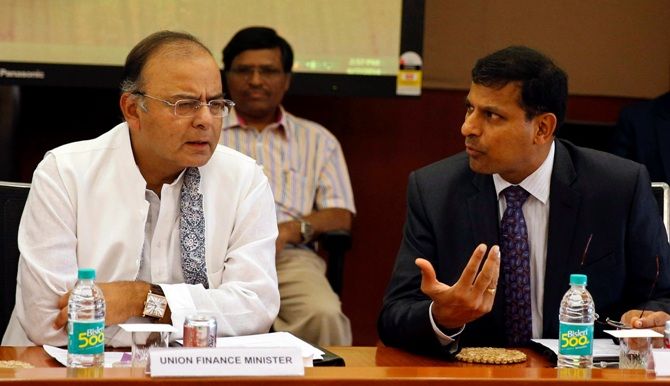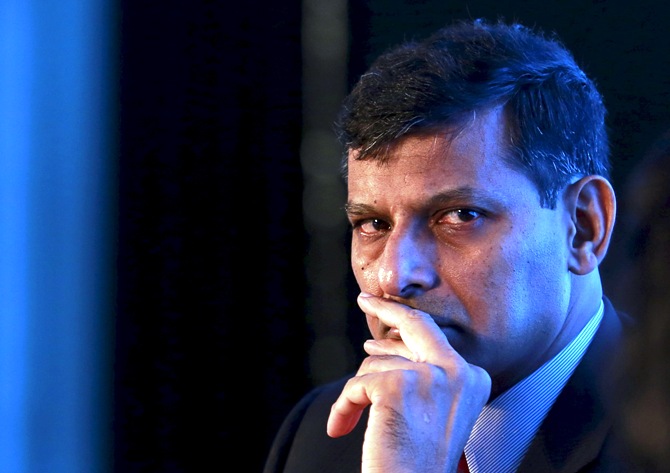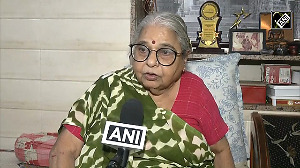'You want a steady, confident, self-assured and highly skilful hand at the till.'
'It is a pity that the BJP has decided to deprive itself of such a hand at this politically sensitive time.'
'It is like sacking your surgeon in the middle of your brain surgery.'
'I do not understand what compulsions led the BJP towards this harakiri,' says banker S Muralidharan.

Now that dirty politics has triumphed over good sense, the game has begun in earnest to have a pliable RBI Governor with no standing of his own except personal rapport with the ruling dispensation.
That they would do this at this crucial juncture shows the scant regard the political classes have for the economy and the people.
Take a moment to consider a not very dissimilar situation in the UK: Bank of England Governor Mark Carney came with outstanding central banking credentials for having piloted Canada's economic boat through turbulent economic seas following the 2007-2008 financial crisis.
He too has enjoyed a prominent public profile conferred on him by the media. He is also in the thick of economic uncertainties stemming from Britain's ambivalence about her place in Europe.
Unlike Dr Rajan, Carney is not even the citizen of the country whose central bank he heads -- he is a Canadian. He has also not been silent on the political hot-button issues of the day such as Brexit. Carney has not been shy of publicly warning of the dire consequences of Brexit. He has not been vilified the way Dr Rajan has been by all and sundry.
How then did we come to such a pass?
The public face of 'Get Rajan Out' is, of course, the one and only Dr Subramanian Swamy whose antics while always entertaining are not always founded on facts nor for the greater good.
Some say he was angling for Jaitley's job and getting at Rajan was his way of targeting the finance minister. That an unelected (Swamy is only nominated to the Rajya Sabha) person can visit such catastrophe on the nation speaks volumes about our democracy.
Some others say Dr Rajan paid the price for his initial high profile (not his fault that Shobhaa De openly spoke of his handsome-ness) and his disagreements with his boss (Jaitley) early in his job.
Dr Rajan stood his ground for valid reasons and now the country will pay dearly for it. That his actions tamed inflation from 10% when he took the job to 5% now seems to be of no relevance.
The sanctity and importance of an independent central bank and its head were never better highlighted than in the highly polarised and highly charged US during and after the latest financial crisis.
First Ben Bernanke and later Janet Yellen were viscerally disliked by the Republicans who held control of the legislature. Despite all the political posturings and vendettas and accusations of favouring the Big Banks with the bailout and of being 'Socialist,' when the crunch came, they were both confirmed.
On a normal day I would not put any of the current crop of American legislators above the ones we have -- they just dress differently -- but the former did not proceed to destroy an institution called the Fed.
The third group baying for Rajan's blood was the business lobby who pinned all their hopes on interest rate cuts. I argued earlier how insignificant is the effect of a 0.25% rate on their firms' financials, although they would have the public believe otherwise.
Where it does matter is in their private borrowings. These are very sizeable and are essential for maintaining their holdings in and control over their publicly quoted companies.
A reduction in interest rates will increase the distributable surpluses in their public companies while at the same time reducing the cost of their shareholdings, thus enabling them to maintain their holdings without having to dilute them. With Dr Rajan gone, this group should be able to breathe easier for a while.
I sometimes think the rate cut issue was a red herring and that the real reason for the business tycoons' discomfiture was Dr Rajan's relentless push to get bad loans recognised and provided for and for the tycoons to be pursued by the banks in the courts of law -- Vijay Mallya is only the tip of the iceberg.
Dr Rajan's policies were posing a serious threat to their vast empires built on huge mountains of debt sourced from public sector banks. They were doing quite well until he came along with his fancy views on banks and their viability.
The fourth group's ability to directly impact the RBI governor's tenure is moderate at best, but their unhappiness with Dr Rajan's RBI has been very loud indeed -- the PSU bankers.
Dr Rajan's strict norms for cleaning up their balance sheets discomfited them considerably, for it not only made many a skeleton tumble out of their full cupboards but also necessitated urgent and purposeful remedial action as also recapitalisation of their banks; action such as pursuing defaulting and recalcitrant defaulters.
More importantly, they would have to devise new ways of pre-disbursal appraisal which could help them tell wheat from chaff. That was, to say the least, unappealing to the bankers brought up on a solid diet of literally following the leader.'
As for capital, alas, it is not forthcoming from the government. Here is where the murky effects of ownership and control of banks by government gets even murkier.
Bankers don't want their dodgy lending to come out in the open; they cannot get fresh capital to plug the holes in their balance sheets; the government doesn't have the cash to recapitalise these banks even in the normal course, let alone after the accelerated and aggressive recognition of bad loans.
Paper capitalisation (in which the government gives capital to banks on the condition that they promptly give it back by way of investments in government bonds) is a weak dodge at best and would be frowned upon if a corporate were to resort to it.
The problems were many. But the solution was simple and easy. When you get bad news, shoot the messenger, Governor Rajan. This pleases all the different actors in this Greek tragedy: The saffron brigade pushing Kautilyanomics without having ever read Kautilya, the ruling dispensation bent on erasing every legacy of the previous government, even the good ones, the past and future defaulters building their wealth at the cost of the public banks, and tireless and tiresome political gadflies who only destroy, never build.
Dr Rajan's exit will solve some problems for a few, at the expense of the many. But isn't that the flavour of 21st century political economy, robbing millions of Pauls to pay a handful of Peters?
The PM's behaviour when all these shenanigans were playing out does not augur well for the RBI's future. Instead of swiftly putting down the attempts to publicly malign an institution of great importance, he maintained a studious silence to the point of inspiring wags to speculate that he was behind the 'eject Rajan' movement.
Predicting what a government would do next in such circumstances is a futile enterprise at the best of times; even more so in the current context. But what they should do is simple enough: Get Rajan's doppelganger. More importantly what they should NOT do is get a rubber stamp. Indications are that that is precisely what will happen.
The question as to who should succeed Dr Rajan can be answered in two parts: The skills and credentials required and secondly, who are the candidates who possess such skills.
What qualities should Dr Rajan's successor possess? As I pointed in the previous paragraph, he should be Dr Rajan's alter ego, doppelganger, xerox copy, what have you.
The greatest need of the hour is to contain inflation and take it down a peg or two if possible -- this makes political sense for the BJP. With crude prices reaching nearly $50 a barrel and headed further up, the short honeymoon with low oil prices is over.
In India we have seen that a rise in the price of crude almost immediately stokes retail inflation. The psychological impact of rising crude prices contributes even more to retail price rise than the price of crude itself.
Given that the BJP's footprint is as 'national' as the Anna DMK is 'national,' it will try to get as much traction in the states as it can, starting with the UP elections. In this endeavour retail prices and subsidies are both holy cows. Cuts in subsidies and spending can both be electorally counterproductive for the BJP.
Thus, the only levers available for the government for inflation control are interest rate and to a lesser extent, money supply. It is like steering a cruise ship with a broken rudder through the Corinthian Canal.
You want a steady, confident, self-assured and highly skilful hand at the till. It is a pity that the BJP has decided to deprive itself of such a hand at this politically sensitive time for it. It is like sacking your surgeon in the middle of your brain surgery. I do not understand what compulsions led the BJP towards this harakiri.
Externally, things do not look very rosy either. Crude prices are rising as we have already noted. The ever more muddled Middle East scenario makes relative price stability in crude unlikely in the near term.
Plus one cannot underestimate the impact of the strife that is being unleashed from that region in the name of religion and the backlash it is inviting from extreme elements in the West. Poland has tuned right, Austria narrowly avoided going that way, Trump is experiencing considerable grassroots support, anti-immigrants sentiment is rising in Europe, and so on.
All these point to a West versus Islam kind of confrontation presaged by Samuel Huntington two decades ago. How destructive this can be to the globally connected economy is quite evident though impossible to quantify.
The uncertainty about the shape of Europe thereafter will take quite a while to settle down, which will adversely affect the fortunes of less robust economies like that of India.
From here on, our own economic policy will have to be carefully calibrated and tweaked on the fly even as global political and economic events unfold. While the government will have to play its part in this endeavour, like sensing key global developments and setting our responses to them, the RBI will be required to play a calming economic role with purposeful but carefully calibrated steps to calm investors, stabilise the exchange rates, provide sufficient money supply for necessary investments while avoiding bubbles, keep the banks afloat with prudent and sustainable regulations, and so on.
The Indian banking system's accumulated sins have begun to catch up with it. Barring window dressing and wholesale fudging of loan books, which is entirely likely, banks will have to make huge provisions which in some cases will wipe out the bank's capital, necessitating fresh infusion of capital by the government.
The government does not have the money. Its response has been to merge banks and create bigger banks with even greater holes in their balance sheets. It is worthwhile remembering that all recent bank mergers in Europe and the US have been unmitigated disasters despite their freedom to make drastic cuts in labour, wages and branch networks which freedoms Indian banks do not enjoy.
The bankers too are going along with this, no doubt egged on by their own hubris and by the fact that this will keep the skeletal cupboards closed for a while longer. It is surprising Dr Rajan went along with this scam; perhaps he wanted not to be seen fighting everything the government came up with.
His successor will not be invested in this and therefore should fight it. And then again he may not.
Internally, the present government has been unable to pass any meaningful legislation -- the regionalisation of polity has ensured that regional satraps with local power bases and national ambitions enjoy the privilege of power without responsibility.
Their politics is one of brazen populism, characterised by ever larger handouts and which panders to every imaginable -- and some unimaginable -- way of dicing and slicing Indian society.
They extract their tonne of flesh for political support for key legislation, with no guarantee it will be delivered if their preconditions are met.
So what do we have? We have a global economy on the verge of being hit by political and financial tsunamis. The world is teetering on the brink of far reaching political developments in the US and Europe.
We have a government desperate to make electoral gains and thus hamstrung from making tough calls.
Tight money and spending controls are not politically expedient.
We also have a fractured polity which cannot see beyond its captive vote banks.
The 70% of our banking system that is owned and controlled by the government is in fairly dire straits.
Our firms have overdosed on debt and on the brink of major defaults.
Finally, our very own St George who was slaying the inflation dragon has been shown the door.
Doesn't look like a good time to become the Governor of the RBI. Some names are doing the rounds: bankers, economists, academics and, of course, the obligatory bureaucrat.
Will we go for the person with the right skills who can ensure that the economy is able to withstand global headwinds, or will we appoint the least qualified and thus the most grateful one?
Modi alone can tell, and he isn't talking.
In all modern economies the central banks are run by unelected experts independently of the government but within the politico-economic theme outlined by the government.
At times it would seem that the central banks act independently of (and contrary to) the governments' politico-economic agenda. This independence is not accidental. It is necessary to engender and maintain confidence of the public in the economy.
All politics is populist and myopic in a democracy. Allowing populism to drive complex economic issues can be disastrous. Hence, the independence of the central banks.
The practice of this varies in degrees, with some countries paying mere lip service to the idea (India in the first four decades after Independence) and some others going out of their way to let experts run their central banks (as in David Cameron's UK).
Since there are numerous levers for the control of the economy, each one more 'rubbery' than the other, modern central banks tend to target one specific aspect rather than a fuzzy universe.
Inflation targeting is not only more precise than the others, its results can also be measured more precisely. Politically too, it is beneficial to the ruling dispensation of the day, if only they understood it. Inflation targeting is not practicable in the absence of an independent central bank.
S Muralidharan retired as the managing director of BNP Paribas after serving the bank for 20 years. He began his banking career at the State Bank of India and worked at SBI for 12 years.










